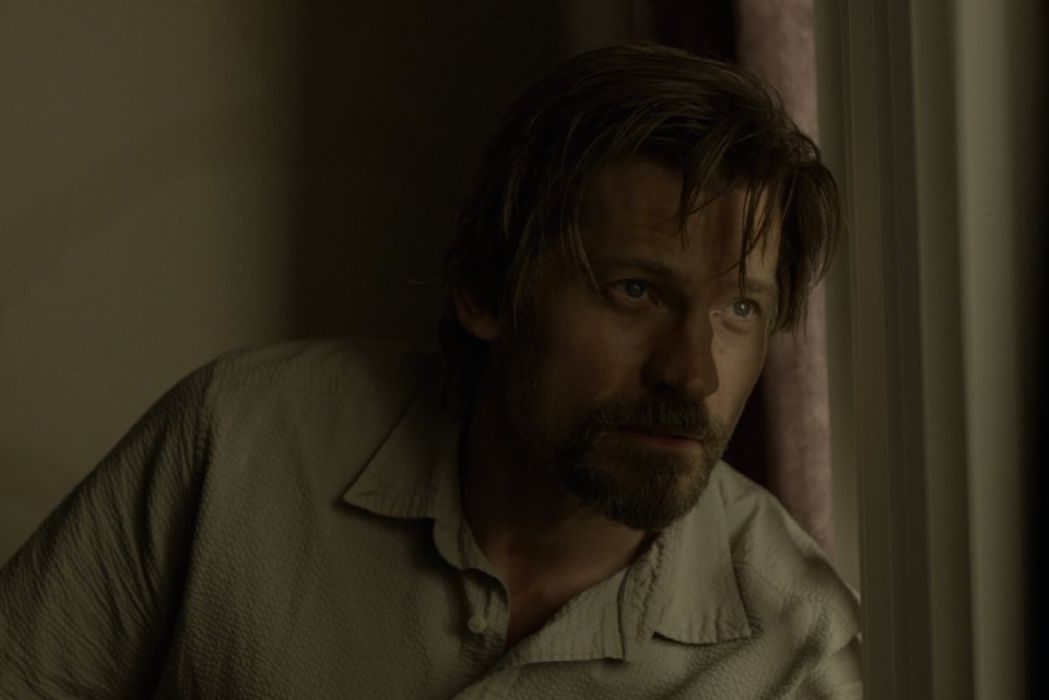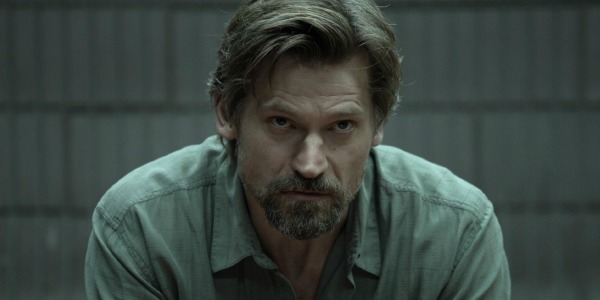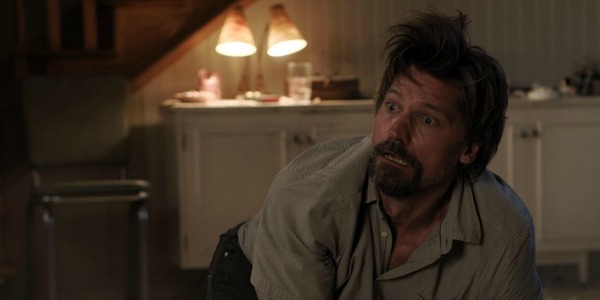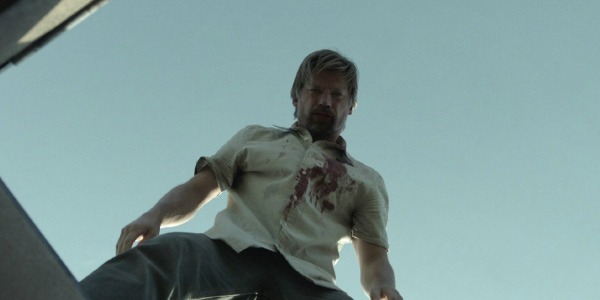SMALL CRIMES: An Uneven Script Dulls This Double-Edged Sword Revenge Yarn

Alex Arabian is a freelance film journalist and filmmaker. His…
Online streaming platforms like Amazon and Netflix are taking over the entertainment industry, providing the widest distribution platform for independent filmmakers. Netflix’s latest acquisition was the rights of the SXSW hit, Small Crimes. Director and co-screenwriter E.L. Katz made such a pitch-perfect debut with the dark comedy thriller, Cheap Thrills, he set the bar considerably high for himself.
Additionally, Macon Blair, riding high off of the success of his Sundance Film Festival Grand Jury Prize-winning penned I Don’t Feel At Home In This World Anymore (also a Netflix acquisition) earlier this year, provides his unique voice to the film as a co-screenwriter, there was a lot of anticipation for Small Crimes.
Katz attempts to keep the cheekiness of Cheap Thrills, which he didn’t write, but ultimately fails, translating the source material into a structurally uneven film that has no idea what it is. Somewhere in the process of translating David Zeltserman’s novel of the same name into a screenplay, Katz and Blair fail to keep the cohesiveness of the critically-acclaimed 2008 literary work. Unfortunately its solid cast, led by Nikolaj Coster-Waldau (Game Of Thrones) as a disgraced ex-cop with narcissistic personality disorder, can’t save the film’s choppy plot.
The Hook Line And Sinker
The film hooks the viewer immediately with Joe’s (Coster-Waldau) captivating opening monologue in prison to a priest, right before he is released from serving a nearly seven-year sentence. He talks about wanting to start anew, how his six years of sobriety has given him clarity to what is important to him: his family. However, it is apparent that Joe doesn’t really know if he can change, and it troubles him deeply. The viewer knows that the road to redemption for Joe is not going to be smooth sailing, given the title and premise of the film, but Coster-Waldau’s committed portrayal of a man at battle with himself is what carries the film and keeps the viewer watching.

Composers Brooke and Will Blair end this scene with groovy throwback track reminiscent of a ’70s B-movie crime caper, seemingly setting the tone of Small Crimes; think Quentin Tarantino’s Jackie Brown soundtrack, and you’ll have an idea. Like that, Joe gets in a taxi, and heads towards an uncertain future. Everything was set up perfectly.
A Tone-Deaf Score By The Blair Brothers
Unfortunately, this would be the only good choice of song in the Blair Brothers’ embarrassingly tone-deaf score. In fact, it is one of the worst film scores in recent memory.
Music in a film is so vital to its success, it can often be a pivotal variable in it. The film already has its faults, but the Blair Brothers’ score only worsens them. After the first song, during a rapid change in pace of the by Katz, the two decided that a spaghetti western tune would be apt during a scene in which Joe beats up four men who try to jump him.
Apparently they felt that, since it worked for Tarantino, it would work for any dark comedy crime yarn. What they didn’t realize is that this film doesn’t pay homage to neither old crime capers in the modern era of filmmaking in any way nor does it show shades of a spaghetti western; they stripped the contextual relevance of some of Tarantino’s scores, making it just seem out of place.
Then, as Joe comes home to his parents, played well by the always-reliable Jackie Weaver and Robert Forster, who are overtly afraid of him, the score turns into one reflecting a mystery film. However, this portion of the score is juxtaposed with, of all things, easy-listening, happy, Hawaiian music. Then, in the third act, the Blair Brothers decide a bass-strings, slasher horror-esque score would be appropriate. Their score is almost as bad as their soundtrack choices, ranging from artists representing the late ’70s and ’80s punk scene, to contemporary country, to salsa music.
Katz’s Detailed Eye Is Laudable
Though quite a lot of troublesome aspects to it, Katz‘s direction in this film has its qualities. He takes his time to establish a setting for his viewers, whether it’s lingering shot of a crooked step, a nosy librarian, or a newspaper heading with “slash cop out,” giving subtle hints to the viewer about Joe’s past.

Katz and Blair give subtle hints about Joe’s past as the movie progresses to keep the viewer watching, but Katz instantly urges the viewer to focus on the physical and emotional pain that Joe’s endured as a consequence of the actions that imprisoned him. With an invasive close up of Coster-Waldau’s face as the opening shot as he begins his monologue, Katz provides an uncompromising look at Joe’s tired skin, focusing on each crease, wrinkle, stray hair of his beard, and the darkness under his eyes. Katz proceeds to slowly and precisely zoom out, expanding the film’s world.
Katz makes sure to show that the priest is sceptical about Joe’s newfound faith in his second chance in life. Subtly, Joe’s refusal of the priests offer of communion shows his true colors, solidifies the priests suspicions, and foreshadows his unfortunate fate. Throughout Small Crimes, Katz’s keen eye is drowned out by poorly written secondary characters, bumpy transitions, the poor score, and a bipolar script.
Lazy Writing and Tired Genre Tropes
Katz and Blair’s script is a series of clichés. Forster and Weaver are the concerned parents, warning him not to revert back to his old tendencies. The character of Joe before, an ex-con with an estranged wife and kids who tries to make good. Molly Parker as Charlotte is the love interest the unrepentant Joe doesn’t deserve. She also essentially serves as a plot point for Katz and Blair to show Joe’s humanity, reducing her to a one-dimensional character.
Charlotte, along with the secondary characters played finely by Forster, Weaver, and Gary Cole as a person of Joe’s dark past, his old Lieutenant, are all underdeveloped. Forster and Weaver are powerhouse actors capable of incredible range, yet they have about 10 minutes of screen-time, collectively. Katz and Blair had an opportunity at balancing the stark contrast of jumps in tone with Cole’s comedic background. Indeed, they attempted to have Cole as the comic relief (in what is basically a less-exaggerated version of his Pineapple Express character, without the humor), but the jokes fall flat. Cole’s dry humor lacks wit, uttering “potty humor” lines such as “You heard about Manny. Cancer in the butt.”
Another attempt at comic relief is through Pat Healy’s character of Junior, the ne’er do well son of a crime boss. Healy’s anxiety was perfect for Katz’s Cheap Thrills, but his neuroticism seemingly has no place in this film. Not to discredit Healy, as he is a fine actor who did the best with the material he was given.
As if the the title wasn’t heavy-handed enough, Joe commits a series of figurative and literal “small crimes” that lead to Small Crimes‘s shocking ending. These small crimes come in the form of refusing the priest’s communion, choosing to believe that a prostitute actually needed a ride home, breaking his sobriety, doing cocaine with an old friend, and engaging with Cole’s bad news character in the first place.
Nikolaj Coster-Waldau And Molly Parker Steal The Show
Coster-Waldau provides nuance and emotional commitment as the only multi-dimensional character in Small Crimes. Throughout the film, he mumbles partially rehearsed lines of speeches he intends to give his loved ones to prove he’s changed, doing a fine job of keeping viewer on the fence regarding his commitment to these vows. Even in his silence, there are always gears shifting behind Joe’s sullen, tortured eyes.
The underutilized Parker has a reputation for going above and beyond what is required. The scenes between Joe and Charlotte are a pleasure to watch. Despite a hindering script, these actors are clever enough to bring their own quirks and contributions to their characters.
Furthering The Industry Narrative Shift, Even If Not Every Film Succeeds
Charlotte mumbles in Small Crimes that we are not defined to our pasts or bound to it, but we can choose who we decide to be in the present. This idea could be extrapolated and used as the motto for the changing industry characterized by an increasingly fast shift away from large studios and theaters as distribution chains, and an emergence of digital distribution.

Sure, Netflix’s latest acquisition Small Crimes may not be as critically successful as the company hoped for, but that isn’t the point. Most major studios have plenty of bad marks on their records, it’s simply a part of the industry. The point is that independent filmmakers like Katz and Blair have a far better chance of securing widespread distribution on online streaming platforms, and it is mutually economically feasible as a bonus to both parties. It is the ideal business model in the film industry.
Small Crimes’s script fails to capture the continuity of Zeltserman’s novel, and Katz doesn’t make these transitions any smoother at the helm. The Blair brothers fail miserably at trying to give a heartbeat to Small Crimes. However, Coster-Waldau and the rest of the cast do their best with the source material they’re given. Viewers will have to wait until the wild ending full of shootouts, borderline torture-porn (I wasn’t kidding when I said tonally uneven), and a shocking but fitting tragedy.
What did you think about Small Crimes? Do you think Coster-Waldau will get more work after his performance?
Netlfix released Small Crimes on digital platforms on April 28.
Does content like this matter to you?
Become a Member and support film journalism. Unlock access to all of Film Inquiry`s great articles. Join a community of like-minded readers who are passionate about cinema - get access to our private members Network, give back to independent filmmakers, and more.
Alex Arabian is a freelance film journalist and filmmaker. His work has been featured in the San Francisco Examiner, The Playlist, Awards Circuit, and Pop Matters. His favorite film is Edward Scissorhands. Check out more of his work on makingacinephile.com!













